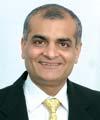Rashesh Shah is not your typical Gujarati businessman. He was among the first in his family to study in an English-medium school at a time when his elder cousins and siblings were in Gujarati-medium ones.
He didn't just step into his father's business -- manufacturing and selling school exercise notebooks -- as all good conservative Gujarati boys tend to. He went on to study higher and higher (he followed a BSc in statistics with a one-year diploma from the Indian Institute of Foreign Trade, and then a two-year MBA from IIM, Ahmedabad), something very few hard-core Gujarati business families consider worthwhile.
Then, he decided to marry Vidya, a Kannadiga girl of his choice, at a time when marrying even a Gujarati outside your own small community was frowned upon. And if all that wasn't enough, Shah convinced his father to mortgage their Peddar Road house in the mid-1990s, to raise seed capital for his fledgling firm, Edelweiss, a step that's brazen enough to give many a conservative Gujarati nothing less than a coronary attack.
 Somewhere in his knack of breaking the mould, Shah's father probably spotted the inherent fire in the belly of his then 33-year-old son and though his father is not here to see the fruits of what he backed, the 44-year-old chairman and managing director of Edelweiss Capital has more than lived up to his father's expectations.
Somewhere in his knack of breaking the mould, Shah's father probably spotted the inherent fire in the belly of his then 33-year-old son and though his father is not here to see the fruits of what he backed, the 44-year-old chairman and managing director of Edelweiss Capital has more than lived up to his father's expectations.
Edelweiss Capital today is one of the few fully home-grown diversified financial services companies (broking is one of its business; 47 per cent of its revenue is from treasury and wholesale financing), competing for clients and employees with the Morgan Stanleys and Jardine Flemings of the world.
It's set a scorching pace of growth: its revenue in the first nine months this year is Rs 680 crore (Rs 6.8 billion), as compared to Rs 370 crore (Rs 3.7 billion) for the entire 2006-07.
It has a market capitalisation of Rs 5,500 crore (Rs 55 billion), an equity base of over Rs 2,000 crore (ten years ago, raising Rs 1 crore had been "quite a challenge"), 1,600 employees and over 40 offices all over India.
We are meeting at the Tea House of the August Moon, Taj Palace's long-surviving Chinese restaurant, where Shah has a lecture to deliver later that afternoon. We order two vegetarian soups, dimsums (a must-have at Tea House) and a vegetarian starter.
After passing out of IIM-A in 1989, Shah joined ICICI. "I had never wanted to be a businessman. I wanted to be a professional, wear a tie and suit, work in a corporate set up," he recalls. His ICICI job exposed him to the best in the business. "I dealt directly with the newly emerging companies that were getting formed at the time -- Infosys, Bharat Forge, United Phosphorous, Mastek and their CEOs. I saw inspired people who were grabbing opportunities everyday," he adds.
It was also a key turning point in the economy. Then finance minister Manmohan Singh had started opening up India as never imagined before. The capital markets, thanks partly to Harshad Mehta, had started to boom. A host of high-quality entrepreneurs with new ideas were accessing them.
Shah and his former colleague and co-founder Venkat Ramaswamy kept toying with the idea of starting a home-grown financial services company, but Shah realised at some point -- after having lived through the coup in Uganda during a one-year assignment -- that "if I don't pull the trigger now, I never will." An avid tennis player, Shah quit in April 1995 (he was then with Prime Securities) to give Edelweiss -- an idea that had been growing in his head -- his best shot and his undivided time.
Fate, however, played tricks with Shah. Just when he took the final gutsy plunge, the market started climbing down (it went from a peak of 4,600 to 3,000), interest rates climbed up and the early impact of lowering duties began to show on industry. The Asian crisis made things worse. By the end of 1995, the state of the economy was looking bleak.
No one can be blamed but a few of the other proposed partners (all of whom were to bring in equity) got cold feet. He had no silver spoon in his mouth and savings, borrowings -- all they had -- were proving short. That's when Shah asked his father to mortgage their house at Peddar Road with Citibank to somehow touch the magical Rs 1 crore figure.
The tiny start-up (with just three employees) was operating out of a grubby office next to Akbarallys in Mumbai's Fountain area. "No one was willing to join us. We couldn't afford to pay much. We were unknown, had no history, very low capital. The odds were against us. The first three years (1996-98) were very bad," he says.
Personally too, it was a time when Shah was grappling with change; he lost his father and, in the process, his guidance and support and his responsibilities mounted with the birth of his first child.
Things began to look up a bit in 1998-2000 and by 2001, Edelweiss had grown to 11 employees. But things were to get worse before they got any better. 2001-03 was what Shah calls "the worst phase for Indian capital markets" (there was a massive drought in India, GDP growth fell to 3.5 per cent, 9/11 happened). "We hit real lows and I used to often think: when will this end?"
But what comes down must go up. 2003 proved to be a sort of take-off point for Shah and Venkat, and ever since, there's been no looking back. In the last four-and-a-half years, the firm has added 350 employees each year.
From a single sleek and gleaming new floor in Express Towers at Nariman Point in mid-2004, today it's spread to five floors and is threatening to slowly but surely take over the building. There are eight other offices at Nariman Point alone. Shah himself has moved from a 2,000 square feet leased flat to his own 3,000-square feet apartment in Worli.
What were his guiding principles and didn't he ever want to give up when the chips were down, I ask. Three golden pieces of advice from Infosys' chief mentor Narayan Murthy ring in Shah's ears even today ("he's had a deeper impact on us than even he may be aware of"). Do not give equity cheap, share benefits with your employees and attempt to build a high-quality organisation.
Shah says he's been very conservative with equity, except when it comes to his employees ("I think we have the maximum number of crorepatis as a percentage of employee base in India"), and that somewhere along the way, "organisation-building became an end in itself." The company compensates people with a combination of cash and equity (800 out of 1,600 own stock), so in bad times, costs are under control and in good times, you make hay while the market shines. "Hopefully, one day, it will be an institution," he adds.
Good advice is just one part of it. Hunger, says Shah, while picking doubtfully at his food. "We are hungry for growth. If the financial services industry has grown at 50-60 per cent for the last five years, Edelweiss has grown at 120 per cent every year for the last five years. One of our targets is to consistently beat the industry growth rate."
His colleagues say that Shah keeps a little yellow notepad on his desk, on which he meticulously lists and crosses out his priorities every day. I picture it saying, "Make sure you beat the industry hard today."
Faith helped too. "You can't have an India story without robust capital markets. So, we kept our faith in the bridge," referring to the capital market, "the bridge between the providers and users of capital." And giving up? He looks at me so blankly I'm sure he doesn't comprehend what that means.
Forget giving up, Shah is quite willing to go through the entire ordeal again if he had to. "I have played tennis for 18 years and I don't like social tennis. I play to win."
He may play to win but believes that luck too has its own role to play. "No matter what you may or may not do, you need to be at the right place at the right time," he says. He says he's been lucky to ride the "India wave" from 2003 and there's definitely been an element of good fortune.
As he finishes his coffee, we open our fortune cookies and I find Shah somehow has two messages in his, while I have only one in mine. Clearly, lady luck is shining on him, in more ways than one.







 © 2025
© 2025